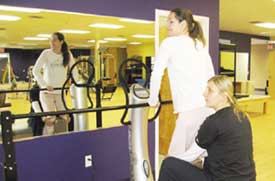February
29, 2008
Determined to walk
By STEPHEN BEALE

Union Leader
Correspondent
GOFFSTOWN - It began with a twitch in her knee.
Sitting in her hospital bed, Kelly Thomas was recovering
from a car accident days before Christmas 1999 that had
severed her lower spine. She had cried when doctors told
her that her back was broken, but she did not know what
to say when they told her she was paralyzed.
At first, the 15-year-old did not know what that meant.
Then doctors at the Concord rehab center told her she
would never be able to walk.
"I was depressed and I just didn't want to do anything,"
she said. "Then all of the sudden I could move my knee.
I could feel my kneecap."
If she could move her knee, Thomas thought, she might be
able to do more.

Kelly Thomas-Saykaly undergoes physical
therapy at Project Walk in Canton, Mass.
She told anyone who would
listen that she was going to be walking again by the end
of the January, despite what doctors had told her.
"I was kind of like, 'I'm going to do it anyway,'"
Thomas-Saykaly said. "I'm going to show them."
It took leg braces up to her waist, a back brace, and a
firm grip on two bars to her left and right for her to
take her first steps. Undaunted, she accepted an
invitation to a prom in Maine that April, where she was
able to stand on the dance floor, hiding her leg braces
under her dress.
Four years later, in 2004, she made good on her vow to
walk down the aisle at her wedding, with the aid of
braces, crutches and two people on either side. "It took
a while, but everybody was crying," said her mother,
Janice Aubin.
Since her accident she has gone kayaking, swam with
dolphins, and even parasailed on a cruise in the
Caribbean. But walking remains an uphill battle for
Thomas-Saykaly.
Someday, she hopes she will only need crutches, or just
a cane.
That goal is not out of reach, according to Dan
Cummings, the business manager for Project Walk, a
California-based recovery program for people with spinal
cord injuries which opened a regional center in the
Boston area last month.
Project Walk is more of a gym than a rehab center or
hospital. Clients spend several hours a week working out
on treadmills, weights, and other machines, one-on-one
with trainers, known as exercise physiologists.
The process starts out simply enough: a trainer will
move a leg or arm muscle, asking the client to imagine
they are doing it. After numerous repetitions, perhaps
millions, the signals the brain has been sending down
through the injured spinal cord connect.
Even a severed spine, which Thomas-Saykaly has, is no
obstacle.
"The nerve signals will jump and they will recover and
they will re-grow," Cummings said.
The approach is different from that backed by many
doctors and therapists. Cummings, who was paralyzed from
the neck down in a swimming accident in 2000, said that
like many patients, he was prescribed medication to
eliminate the spastic movements he felt in his legs
after those injuries.
But it is precisely those spasms that offer hope to
people with spinal cord injuries that their brain is
somehow still communicating with the rest of their body.
"You're trying to get signals down to your legs,"
Cummings said. "Why would you take something that kills
these signals. It just doesn't make sense."
Thomas-Saykaly and Cummings both have been through
therapy that taught them how to live within the confines
of a wheelchair. At her first rehab center, nurses
focused on teaching Thomas-Saykaly how to dress herself,
brush her teeth and operate her wheelchair.
At Project Walk, Cummings and his colleague encourage
people like Thomas-Saykaly to get out of their
wheelchairs. "What we're saying is, it is a possibility.
You do have an opportunity to walk after a spinal cord
injury."
But that opportunity comes at a high price. Thomas-Saykaly
began going to Project Walk's facility in Canton, Mass.,
in January. It her costs her $100 for each one-hour
session.
The bill for a typical week is $400. And insurance will
not pick up any of the costs, since Project Walk does
not have doctors on staff.
After just a few weeks in the program, Thomas-Saykaly
can already measure her progress. Pressing weights with
her legs, she can handle 50 pounds now. Her trainer
challenged her to 75 by the end of the month.
Thomas-Saykaly took that challenge and raised it to 100
pounds.
"Thursday is my deadline," she said with a smile.
RELATED INFORMATION
More information about the
fundraiser in Pinardville.
Heather and Stacey of Two Friends Cafe, Bagel & Deli are
donating all proceeds from hot and cold coffee this
Saturday & Sunday to help defray Kelly's cost of rehab
at 'Project Walk', so please find a moment to stop in
and if you have even more time, hang around and enjoy
the company in the Cafe'.
Stop in at the Cafe' for their new Hot Breakfast on the
weekends.......
http://www.twofriendsbagel.com/Breakfast Menu.htm
Reproduced by the Goffstown
Residents Association.
|





